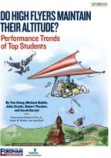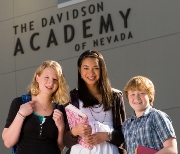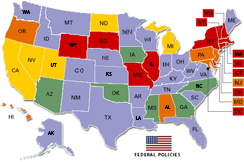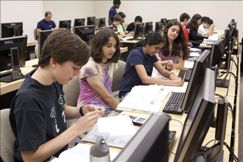|
 September 2011
September 2011 |
|
|
|
What's New in Gifted Education | Davidson News | Legislative & Policy News | On the Web | In the News | In the
Spotlight
|
|
What's New in Gifted Education
|
| |
Announcing the 2011 Davidson Fellows
 Meet the
2011 Davidson Fellows! Davidson Fellows have completed graduate-level projects/portfolios that have the potential to benefit society. Each will receive a scholarship and be recognized for their achievements at a special awards reception sponsored by U.S. Senators Harry Reid (NV) and Chuck Grassley (IA) in Washington, D.C. Meet the
2011 Davidson Fellows! Davidson Fellows have completed graduate-level projects/portfolios that have the potential to benefit society. Each will receive a scholarship and be recognized for their achievements at a special awards reception sponsored by U.S. Senators Harry Reid (NV) and Chuck Grassley (IA) in Washington, D.C.
2012 Davidson Fellows Scholarship Applications
Application requirements for the 2012 Davidson Fellows scholarships have recently been posted!
New for 2012, age eligibility criteria is changing -
students must be 18 or younger as of October 4, 2012.
The Davidson Institute offers $10,000, $25,000 and $50,000
scholarships to students whose projects have the potential
to benefit society, and are equivalent to college graduate
level with a depth of knowledge in their particular area of
study.
"Do High Flyers Maintain Their Altitude? Performance Trends
of Top Students"
 The Thomas B. Fordham Institute recently released
the report, "Do High Flyers Maintain Their Altitude? Performance Trends of Top Students."
It is the first to examine the performance of America’s highest-achieving children over time at the individual-student level.
The study finds that many high-achieving students struggle to maintain their elite performance over the years and often
do not improve their reading ability at the same rate as
other students. The report raises some disconcerting questions: Is our obsession with closing achievement gaps and “leaving no child behind” coming at the expense of
gifted students, as well as America’s future international competitiveness?
View the
Press Release (PDF). Source:
Education Week The Thomas B. Fordham Institute recently released
the report, "Do High Flyers Maintain Their Altitude? Performance Trends of Top Students."
It is the first to examine the performance of America’s highest-achieving children over time at the individual-student level.
The study finds that many high-achieving students struggle to maintain their elite performance over the years and often
do not improve their reading ability at the same rate as
other students. The report raises some disconcerting questions: Is our obsession with closing achievement gaps and “leaving no child behind” coming at the expense of
gifted students, as well as America’s future international competitiveness?
View the
Press Release (PDF). Source:
Education Week
|
|
|
|
Davidson News
|
| |
The Davidson Academy of Nevada
 The 2011-2012 school year is underway as of Aug. 29 with 140 students enrolled. Welcome new students and welcome back returning students!
The 2011-2012 school year is underway as of Aug. 29 with 140 students enrolled. Welcome new students and welcome back returning students!
A free public school, The Davidson Academy of Nevada
encourages and supports the abilities, strengths, and
interests of profoundly gifted middle and high school
students
who score in the 99.9th percentile on IQ or college entrance
tests, such as the SAT or ACT. If you are interested in applying to The Davidson Academy
for the 2012-2013 school year, visit
the
How to Apply page to download the application PDF
files. Please review the
recently updated
Qualification Criteria page and the
Application Review Process page for more information.
To read more about The Davidson Academy, here are two recent
Christian Science Monitor articles:
Upcoming Tours for Prospective Students
Hear from current students and Academy parents, familiarize yourself with faculty and staff, network with others and ask specific questions at
one of the
upcoming tour dates. RSVPs are required.
- Friday, Oct. 21, 2011
- Friday, Nov. 18, 2011
- Friday, Dec. 16, 2011
EXPLORE Test to be offered at The Davidson Academy in October
In conjunction with the University of Iowa’s Belin-Blank Exceptional Student Talent Search (BESTS), The Davidson Academy will serve as a test site for the two-hour
EXPLORE® test on Saturday, Oct. 22, 2011. The EXPLORE® test, developed by ACT for eighth graders, is an effective above-level test for younger students, grades 4-6, and provides the opportunity to demonstrate their advanced abilities. An
EXPLORE® test score can be used in the context of eligibility criteria for the
Davidson Young Scholars program as well as
The Davidson Academy. Parents or
teachers of students who are very talented in mathematics can use the EXPLORE® scores as part of
IDEAL Solutions for Math Acceleration, which is a web-based system for making decisions about math acceleration.
To register, visit
this page and click on “Register” under the EXPLORE menu
on the left side of the screen. The cost is $58 per student
and the deadline to register for The Davidson Academy
location is Monday, Oct. 3. The goal of BESTS is to discover
students who need further educational challenge to fully
realize their academic talent.
 Davidson
Young Scholars Davidson
Young Scholars
The Davidson Young Scholars program provides FREE services designed to nurture and support profoundly gifted young people and their families, including talent development and educational advocacy, an online community, annual get-togethers, and the Ambassador Program. Applications are due the
first of each month.
For more information, see the
How to Apply and
Qualification Criteria
pages.
 Educators
Guild Educators
Guild
The Davidson Institute's
Educators Guild is a FREE national
service for active elementary, secondary and post-secondary
educators, as well as other professionals who are committed
to meeting the unique academic needs of gifted students.
For the cost of staff traveling expenses, the Educators Guild offers
presentations to schools with faculty interested in learning more about gifted students.
You can also become a member of the online community with access to free consulting services and Educators Guild publications
by subscribing
here. If you would like more information, please email EdGuild@davidsongifted.org.
Gifted Issues Discussion Forum
 The
Gifted Issues Discussion Forum is
a meeting place for all things gifted.
Register and become a part of one of the most active gifted
education forums on the web! With more than 4,700
registered members, it's a great place to share and interact
with others about a wealth of gifted topics. The
Gifted Issues Discussion Forum is
a meeting place for all things gifted.
Register and become a part of one of the most active gifted
education forums on the web! With more than 4,700
registered members, it's a great place to share and interact
with others about a wealth of gifted topics.
|
|
|
|
Legislative & Policy News
|
| |
NATIONAL – The
TALENT Act was introduced to the House of Representatives and Senate by
Representatives Elton Gallegly (CA) and Donald Payne (NJ) and Senators Chuck
Grassley (IA) and Bob Casey (PA). It would require states to note when
students perform above grade level and report their learning gains as part of
state report cards. It would also mandate more professional development for
teachers in gifted education and require Title I schools to create plans to
better identify minority and disadvantaged students as gifted. This
Christian Science Monitor article describes how the Talent Act could help gifted students when it comes to learning math.
Source: National Association for Gifted Children (NAGC)
ARIZONA
– The Science, Technology, Education, Agriculture and Mathematics (STEAM) Early College Academy recently received a $75,000 grant from the Science Foundation of Arizona. Source:
Yuma Sun
 A new pilot program in Scottsdale is clustering students in grades K-2 at four elementary schools for gifted education. The program is part of the district's push to offer gifted education to more students. The district also offers some self-contained classes for gifted students. Source:
Arizona Republic A new pilot program in Scottsdale is clustering students in grades K-2 at four elementary schools for gifted education. The program is part of the district's push to offer gifted education to more students. The district also offers some self-contained classes for gifted students. Source:
Arizona Republic
COLORADO – Eagle County Schools are changing their methods for identifying gifted students, moving from a one-day testing process to a cycle of continual observation. All students will be tested in second grade, but educators will use “Response to Intervention” and “Common Formative Assessments” to observe students' performance at all grade levels. Source:
Vail Daily
MAINE – A number of Bangor high school students have started taking classes at Early College High School, or, “The Pleasant Street Academy,” a first of its kind in Maine. The school is a joint project between the University of Maine at Fort Kent and Fort Kent Community High School. Source:
Bangor Daily News
MARYLAND – The Montgomery County Public Schools (MCPS) are no longer offering acceleration in math. In a letter
sent home to parents about the MCPS curriculum 2.0, Principal Barbara Leister of Wyngate Elementary School in Bethesda explains that the new math standards are so rigorous that “the previous practice of grade skipping acceleration in mathematics will not be necessary for most students.” Source:
Bethesda Magazine
MISSOURI – The Kirkwood School District is taking a number of steps to better identify gifted students, attempting to provide them with more opportunities to excel at the elementary and middle school levels. Changes to the identification process will allow the district to better assess students by taking a more holistic approach. Source:
Webster Kirkwood Times
NORTH CAROLINA – The North Carolina Governor’s School (NCGS) Foundation is attempting to raise $1 million for the
Governor’s School in 2012. This follows a recent outpouring of support that saw more than $175,000 donated by alumni in July. The State Board of Education recommended opening the school in 2012 provided that the Foundation can raise at least $550,000 by Nov. 1, but the Foundation is setting their goals even higher. Source:
NCGS Foundation
OHIO – According to Ohio Department of Education data, wealthier districts generally have a higher percentage of students identified as gifted. The amount of times a student is tested for giftedness depends upon on the district in which a student is located. Source:
Newark Advocate
PENNSYLVANIA – The Pennsylvania Cyber Charter School, the largest online school in Pennsylvania, is launching a new program in science, technology, engineering and math to debut in 2013 or 2014. This year, in preparation for the STEM program, the school is offering freshmen courses in robotics and biometrics. Source:
Pittsburgh Post-Gazette
TEXAS
– Due to a budget surplus, the Keller Independent School District will use
$313,000 to create a mobile learning lab for gifted and talented students, an
area that lost some funding for teachers. Source:
Fort Worth Star Telegram
WASHINGTON
– The Lake Washington School District will change the grades in which gifted education is offered from first through ninth grade to second through eighth grade. Source:
Kirkland Reporter

How gifted-friendly is your state? Find out
on the
Davidson Gifted Database State Policy Map.
If you know of new legislation, please contact the
Communications Team.
|
|
|
|
On the Web
|
|
|
|
In the News
|
| |
September 22, 2011 -
Health Canal,
Rethinking Gifted Education Policy – A Call to Action
(Staff)
September 20, 2011 -
New York Times,
MacArthur Foundation Selects 22 ‘Geniuses’
(Felicia R. Lee)
September 20,
2011 -
Journal and Courier,
WL senior rewarded for math discovery
(Mikel Livingston)
September 15, 2011 -
Forbes,
10 Tips: How Parents Can Nurture Their Teenage Tech Prodigies
(Coeli Carr)
September 14, 2011 -
New York Times,
The Educational Experiences That Change a Life
(Staff)
September 12, 2011 -
The News Tribune,
Teen’s smarts land her prestigious scholarship
(Staff)
September 11, 2011 -
Washington Post,
Judging schools by advanced scores
(Jay Mathews)
September 7, 2011 -
Innovative Educator,
Education Reform Lessons from an 8-Year-Old Author
(Gwyn Ridenhour)
September 5, 2011 -
Great Falls T ribune,
The many definitions of giftedness
(Darci Herbstritt)
August 31, 2011 -
Christian Science Monitor,
Gifted students shine when mined
(Stacy Teicher Khadaroo)
August 31, 2011 -
Christian Science Monitor,
A public school for the brightest
(Stacy Teicher Khadaroo)
August 31, 2011 -
Christian Science Monitor,
Back to school: Are we leaving gifted students behind?
(S. Khadaroo)
August 29, 2011 -
Huffington Post,
Too Young? My Fight Against Reverse Age Discrimination
(K. Caetano-Anollés)
August 24, 2011 -
Charlotte Observer,
Opportunities for gifted students to excel are limited
(K. Stephens & A. Robinson)
August 23, 2011 -
The Examiner,
The movement to emphasize services over labels in GT education
(Kumar Singam)
August 22, 2011 -
Mental Floss,
Mad Scientist of the Month: Who’s Afraid of Taylor Wilson?
(Judy Dutton)
August 20, 2011 -
RecordNet.com,
Are gifted children victims of No Child Left Behind?
(Robert D. Morrow)
August 10, 2011 - Canton-Sixes Patch,
Is My Child Gifted?
(Leslie Olejnik)
Discuss these stories and
more on the
Gifted Issues Discussion Forum.
|
|
|
|
In the
Spotlight
|
| |
Highly Capable Program in the State of Washington - Q & A on Legislation
and Advocacy
In the
summer of 2011, the
Washington Coalition for Gifted Education and local
advocates were instrumental in advocating for a number of
legislative changes related to gifted education. This
article contains answers to a number of questions presented
by the Davidson Institute for Talent Development.
Please
tell us about the new
Highly Capable
Program (HCP). How will gifted education change in the
state of Washington, compared to how it was previously?
Since 1984, services to Highly Capable Students (the
Washington term for gifted students) have been on a
voluntary basis. Districts applied for state grants to
support their efforts. Districts who accepted these funds
followed the state administrative code requirements for
identification and programs.  Districts determine the extent
and type of services and file a year-end report on program
status. The most recent report summary showed 206 of the 295
school districts in the state participated in the program,
down substantially from prior years. Districts determine the extent
and type of services and file a year-end report on program
status. The most recent report summary showed 206 of the 295
school districts in the state participated in the program,
down substantially from prior years.
In 2009 the Legislature found "that for highly capable
students, access to accelerated learning and enhanced
instruction is access to a basic education" and proposed a
new funding formula. HB 2261, Section 708(1) was a statement
of intent only and it required action by the Legislature in
the 2011 session to implement it. When SB 5919 takes effect
in September 2011, Washington will be the first, and only,
state in the union to fund appropriate services for gifted
students within basic education rather than as a
supplement to it. The bill did it by making
"Programs for highly capable students" part of "the
instructional program of basic education provided by each
school district." The 2011-2013 budget provided supplemental
enhanced funds to HCPs under the new definition of basic
education.
Can
you tell us about some of your efforts in implementing these
changes?
This has been a multi-year project with
many participants. There are three statewide groups who
advocate for these students:
Though separate, we coordinate efforts and decide on yearly
goals through a joint leadership committee with
representatives from each group. We meet several times a
year in response to ongoing events in the Legislature. We
employ a lobbyist who works directly with legislators and
rely on volunteers to mobilize members of each group.
Volunteers make personal contacts with their legislators,
organize and participate in email blitzes, testify at
committee meetings, and attend Gifted Education Day at the
capitol during session.
In addition, many local groups have joined with us in our
efforts; the activities of one are described in response to
question four. Local groups strongly involved in their own
programs are often willing to also participate in activities
focused on the state Legislature. A majority of funding for
programs in Washington is local, but without the state
funds, many districts would be unwilling to expend local
funds for a program the state does not support monetarily.
Thus the actions of the Legislature remain key to prosperity
for HCP programs.
Do you
have any advice for parents and advocates in other states in
carrying out similar changes?
All advocacy
groups both local and state-wide need to work together to
devise a focused effort with the legislature and the office
of education for their state. Some states have already
combined all their state-wide advocacy groups into one
organization while others continue, as does Washington, to
maintain separate groups who work together using a
leadership group to communicate and focus on issues. We
maintain a central communication node to keep all parties
informed.
 Work with what you have. Take advantage of
opportunities to advocate on behalf of your gifted children;
try to create opportunities. Seek alliances with other
education groups in your state to support your issue/focus:
two of our influential supporters are the state PTA and the
Washington State School Directors Association. Finding
committed legislators to support your efforts is vital.
Contact legislators who hold key positions on education
committees or in legislative leadership. Working closely
with our key supporters we accomplished last year’s goals. Work with what you have. Take advantage of
opportunities to advocate on behalf of your gifted children;
try to create opportunities. Seek alliances with other
education groups in your state to support your issue/focus:
two of our influential supporters are the state PTA and the
Washington State School Directors Association. Finding
committed legislators to support your efforts is vital.
Contact legislators who hold key positions on education
committees or in legislative leadership. Working closely
with our key supporters we accomplished last year’s goals.
To read more about these amazing advocacy efforts and the
recent developments in Washington, please view
this article in the Davidson Gifted Database.
The Davidson Institute would like to thank numerous
people who helped answer these questions, especially Barbara
Poyneer of the Washington Coalition for Gifted Education and
Amy Prezbindoski.
|
|
|
|
Closing Thought
|
| |
"If public education helps all students achieve basic skill levels, is that enough? Should it be up to parents and students to find ways to take learning to a higher level, or does society have something to gain if more schools make it part of their mission?"
~ Stacy Teicher Khadaroo, in the Christian Science Monitor article,
Back to school: Are we leaving gifted students behind?
|
|
|
|
If you have information to include in future eNews-Updates, please email our Communications Team.
If you have been forwarded this eNews-Update, and wish to receive future editions,
sign-up here. |
|
Davidson Institute for Talent Development
Supporting our nation's brightest young minds.
9665 Gateway Drive, Suite B, Reno, Nevada 89521
Phone: 775-852-3483 Fax: 775-852-2184
Email: administrator@davidsongifted.org Web: www.DavidsonGifted.org
Request a Brochure online.
To
subscribe, visit the
Davidson Institute's
eNews-Update archive page on the Davidson Gifted Database.



The Davidson Institute has more than
2,000 "Likes" on
Facebook
and 1,200 followers on
Twitter.
Are you one of them? The Davidson Institute also has a number of
YouTube
videos!
|
 September 2011
September 2011

 Davidson
Young Scholars
Davidson
Young Scholars Educators
Guild
Educators
Guild
 A new pilot program in Scottsdale is clustering students in grades K-2 at four elementary schools for gifted education. The program is part of the district's push to offer gifted education to more students. The district also offers some self-contained classes for gifted students. Source:
A new pilot program in Scottsdale is clustering students in grades K-2 at four elementary schools for gifted education. The program is part of the district's push to offer gifted education to more students. The district also offers some self-contained classes for gifted students. Source:
 Districts determine the extent
and type of services and file a year-end report on program
status. The most recent report summary showed 206 of the 295
school districts in the state participated in the program,
down substantially from prior years.
Districts determine the extent
and type of services and file a year-end report on program
status. The most recent report summary showed 206 of the 295
school districts in the state participated in the program,
down substantially from prior years.  Work with what you have. Take advantage of
opportunities to advocate on behalf of your gifted children;
try to create opportunities. Seek alliances with other
education groups in your state to support your issue/focus:
two of our influential supporters are the state PTA and the
Washington State School Directors Association. Finding
committed legislators to support your efforts is vital.
Contact legislators who hold key positions on education
committees or in legislative leadership. Working closely
with our key supporters we accomplished last year’s goals.
Work with what you have. Take advantage of
opportunities to advocate on behalf of your gifted children;
try to create opportunities. Seek alliances with other
education groups in your state to support your issue/focus:
two of our influential supporters are the state PTA and the
Washington State School Directors Association. Finding
committed legislators to support your efforts is vital.
Contact legislators who hold key positions on education
committees or in legislative leadership. Working closely
with our key supporters we accomplished last year’s goals.